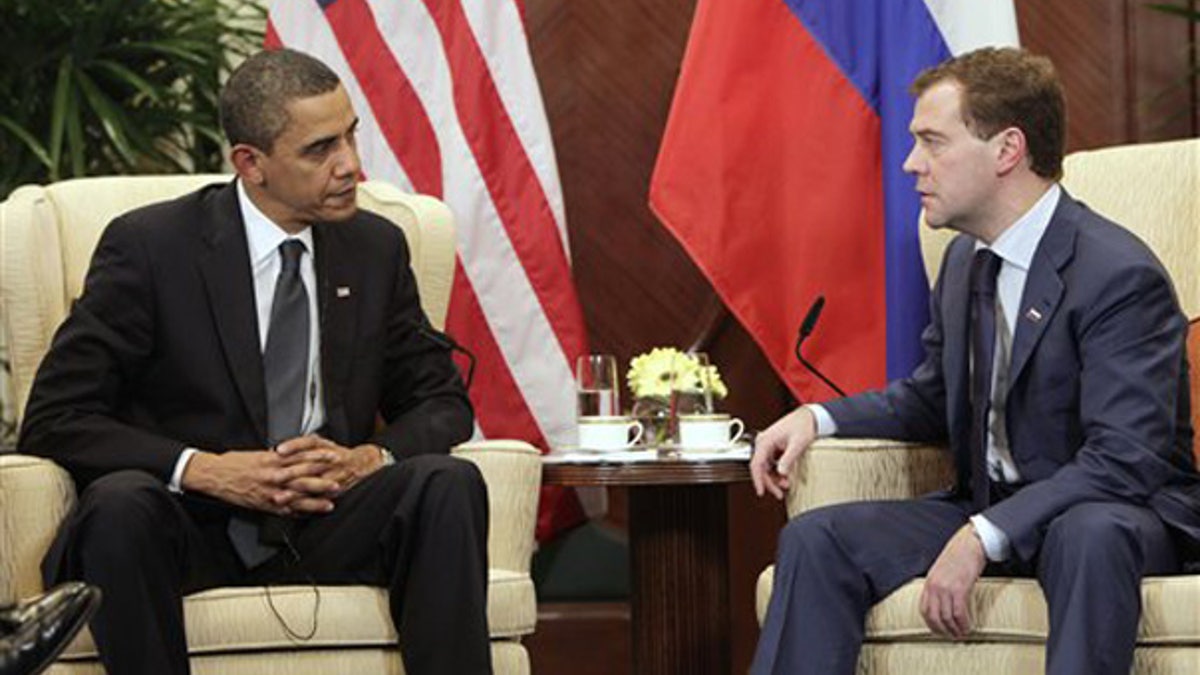
Nov. 15: President Barack Obama meets with Russia's President Dmitry Medvedev on the sidelines of the APEC summit in Singapore. (AP)
SINGAPORE -- President Obama pushed Sunday for continued pressure on Iran and its nuclear program. Appearing with Russian President Dmitry Medvedev, Obama said "we are now running out of time" for Iran to sign on to a deal to ship its enriched uranium out of the country for further processing.
"Unfortunately, so far it appears Iran has been unable to say yes," to the proposal on uranium reprocessing, Obama said.
The five permanent members of the U.N. Security Council -- the U.S., Britain, France, Russia and China -- along with Germany have engaged Iran on its nuclear program, most recently with a deal for it to ship enriched uranium to Russia for further processing as fuel for an aging reactor used for medical treatments.
The United States and its allies believe Iran is using its nuclear program as a cover for building a bomb. Tehran says it only wants to build nuclear reactors to generate electricity.
"We have to continue to maintain urgency and our previous discussions, confirming the need for a dual-track approach, are still the right approach to take. We will begin to discuss and prepare for these other pathways," Obama said.
Medvedev said he remains hopeful the negotiations can lead to "positive result," but that, "In case we fail, other options remain on the table."
He has said further sanctions against Iran were possible if it did not open its nuclear program to inspections to prove it was not trying to build a bomb.
Obama and Medvedev met on the sidelines of the Asia-Pacific summit of APEC nations to announced good progress in negotiations on an updated pact to replace the START nuclear arms agreement that expires on Dec. 5.
Sitting, gesturing and leaning toward his Russian counterpart, Obama said the pair discussed a successor to the 1991 Strategic Arms Reduction Treaty and described "excellent progress over the last several months."
"I'm confident that if we work hard and with a sense of urgency, we'll be able to get that done," Obama said, adding technical issues remain.
Medvedev said he hoped negotiators would "finalize the text of the document by December."
Obama and Medvedev agreed in April to reach a new nuclear arms reduction pact to replace and expand upon the one that was signed by former President George H.W. Bush and Soviet leader Michael Gorbachev.
During a July summit in Moscow, Obama and Medvedev further agreed to cut the number of nuclear warheads each nation possesses to between 1,500 and 1,675 within seven years.
U.S. officials say the two nations now have agreed on the broad outlines of a new treaty, which could be signed during Obama's travels to Europe in early December to accept the Nobel Peace Prize.
Nearing the end of his two days in Singapore, Obama also attended a second summit with leaders of the 10 southeast Asian countries that make up the ASEAN group. Obama was the first U.S. president to sit in on the meetings, that included a senior leader of Burma -- part of a shift in U.S. policy away from isolating the repressive Burma military government.
Afterward, White House spokesman Robert Gibbs said Obama told the gathering, Burma Gen. Thein Sein included, that his government must free long-detained democracy leader and Nobel laureate Aung San Suu Kyi and other political prisoners.
Obama "brought that up directly with that government," Gibbs said.
While Burma ranks high among nations that suppress human rights, a joint statement by the United States and the ASEAN group made no mention of Suu Kyi.
Obama wrapped his official schedule in Singapore late Sunday afternoon by meeting with Indonesia's Susilo Bambang Yudhoyono, president of the world's largest Muslim nation and Obama's home as a boy. Obama said he was excited about the prospect of improving relations with Indonesia and repeated his plan to visit next year.
He said, however, the schedule would depend on his family; he wanted to plan a trip with "Michelle and the girls so they can take a look at some of my old haunts."
The Associated Press contributed to this report.




